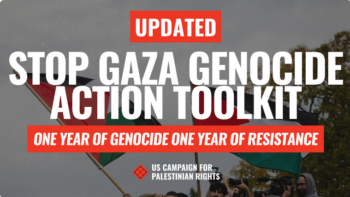Janine Jackson interviewed the US Campaign for Palestinian Rights’ Iman Abid about Israeli genocide for the December 13, 2024, episode of CounterSpin. This is a lightly edited transcript.
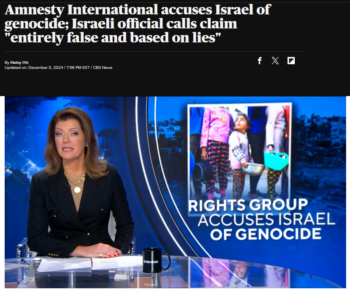
CBS News (12/5/24)
Janine Jackson: “Amnesty International’s report demonstrates that Israel has carried out acts prohibited under the Genocide Convention, with the specific intent to destroy Palestinians in Gaza.” So says Agnès Callamard, secretary general of that human rights group. She says research shows that “Israel has persisted in committing genocidal acts, fully aware of the irreparable harm it was inflicting.”
Amnesty’s statement invokes an “international community” that will hopefully be roused to action. But there are questions about what levers of power that community has access to, and what it means that many or most of that community receive our understanding from elite news media—not just about what’s happening, but about possible responses, and about what the law even means in this context.
Iman Abid is the director of advocacy and organizing at the US Campaign for Palestinian Rights. She joins us now by phone. Welcome to CounterSpin, Iman Abid.
Iman Abid: Thank you so much.
JJ: Genocide isn’t a slur, or an accusation that you just throw at people that you don’t like. There are definitions, and what Amnesty is saying is that those criteria are being met. So can you talk us through how this report—and it’s not the first report—but how and why does it arrive at the conclusion of genocide?
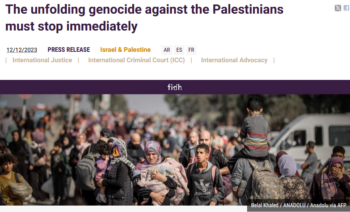
International Federation for Human Rights (12/12/23)
IA: Yeah, I want to acknowledge the fact that we are 14 months into this genocide, and have heard the word genocide being used to describe the situation in Gaza, not just by human rights organizations but the people themselves in Palestine, and many elected officials and different international institutions, such as the International Criminal Court, that have been using the word genocide to help describe the situation. So the fact that we are at this position now, where this internationally renowned human rights organization like Amnesty International is also now joining the ranks, and claiming this as genocide, is hugely profound and necessary.
I think one of the things that they do a profound job at in this report, particularly is highlighting the fact that this thing that’s going on right now is something that meets the entire set of criteria to describe genocide within the Genocide Convention, whether it be genocidal intent, whether it be the deliberate killing of a certain ethnic and cultural population, whether it be the prevention of placement of children. Whatever it is that’s going on, is happening here in Gaza. And the report does a profound job in helping construct just why they are making this claim, and that this is [not] a one-time sort of thing, but rather this has been continuing. This has continued for 14 months, and will continue if no one chooses to stop it.
Throughout the entire report, they do a beautiful job to help folks understand just why this is happening, what specific intent is behind the Israeli government and this military plan that they have on Gaza, as well as the personal harm that has been committed against thousands and thousands of Palestinians over the course of these last 14 months.

Reuters (10/21/24)
And it goes so detailed into describing the personal and bodily harm to people, the amount of deaths that have been committed, the destruction of the infrastructure that people use to stay alive, the prevention of aid, and specifically lifesaving aid to keep people alive. Israel is doing everything in its ability to prevent people from actually living in Gaza.
And Amnesty is trying to build a case that because of those things, and because of the criteria it meets within the Genocide Convention, this is in fact genocide, and it is not disputable, but rather it is time to acknowledge what is going on, look at the facts and the findings of what we’ve seen—and in many cases, actually, Israel has almost presented to the public itself—and to look at everything that’s been livestreamed over the course of these last 14 months, and do everything in our power to try to stop it.
So I think, again, 200 pages of findings and documentation that I think many folks can actually look back on and say, “My God, I actually saw this on social media at one point or another,” or, “I heard this specifically come from the Israeli government’s testaments and testimonials,” and recognize that this is, in fact, something that we have been undergoing now for the last 14 months.
JJ: And the ongoing commission of the crime is part of what’s being talked about. Often when we think of crime, and the way that crime is covered in the media, it’s a one-time act, and so you can think, “Well, the perpetrator, what was in their mind when this one-time act occurred?”
This is not that. This is a different kind of conversation, and I think that’s an important distinction for folks who are just reading about it in the paper as, like, a bad thing that’s happening.
IA: Exactly. I think that’s something that Amnesty has been trying to do, and I want to acknowledge as well, many other human rights experts have been trying to do in this moment. It’s to show that this isn’t something that just happened after October 7, but this has deliberately been extended to happen, and continue to happen, until all Palestinians are annihilated across Gaza.
JJ: And the report, it answers a lot of questions that you might just have in a conversation, you know, with your uncle or with a stranger: Is this just callous disregard? Israel has a goal, they want to destroy Hamas, and they’re not paying enough attention to civilians that are harmed in their carrying out of that process. And this engages that and says, no, this is genocidal intent. It’s not just recklessness.

Iman Abid: They’re trying to do everything in their ability to try to legitimize these killings, and dehumanize Palestinians, as though they are military targets, not actually dignified as everyday people.
(photo: Thomas Morrisey, Rochester Democrat & Chronicle)
IA: Exactly. I think that’s the thing, is that what we’ve seen happen is that Israel is trying to prove to the rest of the world that this is, in fact, not genocide, that this is out of self-defense. But the reality is that so many of the comments have been outlined here in the report and, again, have been available to us just on an everyday basis, the reality is that Israel itself has actually built the case for us in arguing that this is, in fact, genocide. They have used statements to try to dehumanize Palestinians—and all Palestinians, not just those that have been involved in anything—but the fact that all Palestinians, in some way or another, just due to who they are, should be dehumanized. And I think that that is an argument that they’ve been trying to make to help legitimize the mass killings of Palestinians.
There are statements that have been made to completely disregard all human life in Palestine, all across Gaza and even the West Bank, to be able to, again, legitimize this forcible displacement, to legitimize the prevention of lifesaving aid, to legitimize the bombings of residential buildings, to legitimize why they’re bombing hospitals, and claiming that Hamas, for instance, has tunneled underneath hospital grounds.
They’re trying to do everything in their ability to try to legitimize these killings, and dehumanize Palestinians, as though they are military targets, not actually dignified as everyday people, just so that the rest of the world is convinced of why Israel has the right to do this.
And, again, going back to the Amnesty report, it highlights just how this is beyond a military operation, it’s been intentionalized to try to use this moment, and leverage this moment, as a way to continue killing as many Palestinians as possible.
JJ: Well, and I wish it didn’t need saying, but I’ll say it. This report, as with other reports, acknowledges crimes committed by Hamas on October 7, 2023. To say that those crimes are being ignored or being devalued is simply false. It’s just about the conversation of whether they justify what came after, and whether they should be seen in a context of what came before.
When media talk about the US and Israel and their “mutually beneficial relationship,” I always think, well, which US citizens, which even Israeli people are you telling me are individually benefiting?
Media treat nations like kaiju, like Godzilla, like there are monsters that represent countries and fight one another. And to me, that’s a big failing, in terms of representing what the US people believe and want and are capable of, and also what Israeli people want and are capable of. And that’s before we talk about ignoring the voice of Palestinians. There’s just a crudeness of the media coverage that is harmful, I think.
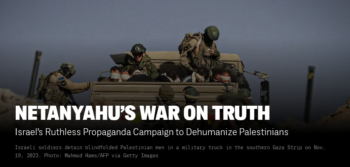
Intercept (2/7/24)
IA: Absolutely. Again, the fact is that for the last 14 months, we as Palestinians, even as a Palestinian-led organization here at the US Campaign for Palestinian Rights, have been trying to do our best to ensure that people do hold to account the Palestinian narrative, and the framing around what is happening.
Israel’s propaganda system is enormous, and it’s very effective. And I think we’ve seen just how media outlets go around saying the same exact thing that has now been used to legitimize this genocide. Rather than arguing the fact that it is genocide, we’re now trying to defend ourselves against the thought that this isn’t genocide, defend ourselves against the people who are saying this isn’t genocide.
And I think that it’s because of the fact that media has done such an incredible job at passing along statements that this is warranted, because of the October 7 attacks, that it’s as if the Palestinian people deserve this because of the October 7 attacks. But in reality, it’s long before October 7, and continues to happen after October 7, that this level of detriment to Palestinian civil society has existed, and Israel has done everything in its power to make these things happen.
I acknowledge the fact that in this moment, we, I think, are seeing a shift in the way that people are actually talking about this. I think that Western news outlets have been forced now to at least acknowledge that there is this mass atrocity happening. Whether or not they choose to use the word “genocide” is still a question, to some degree. But I think that when reports like this get publicized, going back to the Amnesty International report, the hope is here, we can then acknowledge the fact that this report has used, that has even the word “genocide” in its title, to the point that it has to be referenced, it has to be acknowledged.
Now, we know that there are people who go so far as still choosing to refute the 200 pages of evidence and documentation, but we know that that can only go so far.
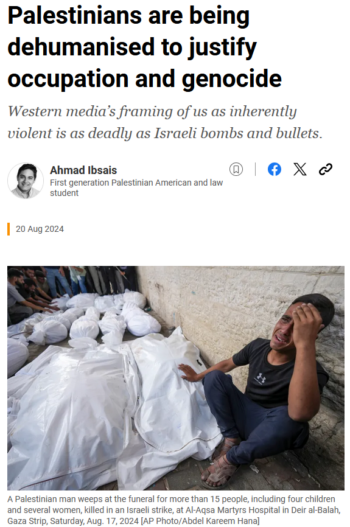
Al Jazeera (8/20/24)
So I think that 14 months in, we’re starting to see a small shift, but I think the reality is there’s lots more work to do around it. And my hope is that reports like this can be used as a way to justify why we’re calling it as it is, and choosing not to actually try to continue using statements or saying statements that can continue legitimizing just what’s happening. Because the rhetoric we use, and especially that journalists use here in the West, is extremely harmful.
And it’s not just dehumanizing to the people in Gaza; it’s actually dehumanizing the Palestinians here in the West as well, so much so that a lot of what’s been heard on media has been used as a way to warrant hate crimes against Palestinians here in the US. And I think we saw that happen over the course of the last year. A young 6-year-old boy killed in the Chicago area, a young girl was slashed in the throat. That language is extremely violent, and can be used to justify this level of hate against a certain group of people. Again, not just in Palestine, but here across the West, for Palestinians as well.
JJ: Israel’s official response, as I see it so far in US media, is really not to address the substance, but to say Amnesty International is “deplorable and fanatical.” So then the way that we know that media choose to use a binary framing—us versus them, he said, she said—so it’s not even, “Let’s look at the substance here.” It’s just, “Oh, consider the source. Some people think Amnesty is a fanatical organization.” But I hear you saying that there are hopeful spaces in terms of media coverage, and in terms of this report pushing through in the narrative.
IA: Absolutely. I mean, even trying to debate whether or not Amnesty is legitimate or not still forces the conversation on genocide to happen. What Israel is doing right now is forcing this conversation, and even using the word “genocide,” and creating this battle out of it, that starts to make more people start to question, “Well, just why is it that this international human rights organization has put out such a report right at this moment?”
And it’s been used as a vehicle to try to prevent these things from continuing to Gaza, right? Amnesty is trying to do, in their best ability, to try to actually put something out there that can be used as a way to help us stop sending weapons to Israel, to stop sending military funding to Israel, to stop us from being complicit in this genocide here in the US, and to encourage even more elected officials to take that stance, as well as to use this as a vehicle to help explain to the American public audience, for those that are still on the fence around what is happening, that there is clear documentation, evidence, proof, whatever you want to call it, to help describe the situation, that they can then use to convince more people.
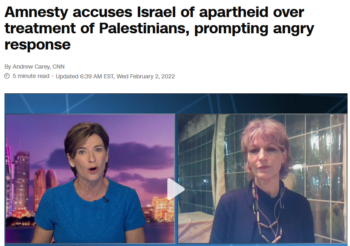
CNN (2/2/22)
I think the American public has actually been shifted dramatically over the course of this last year. We saw 70% of American voters are in agreement with the fact that this genocide does need to end, and the fact is that we know that that number continues to grow, as people have seen things escalate. And I think we want to continue seeing that happen. We want to continue educating people, and doing all of that.
This is not the first time Israel has tried to delegitimize a human rights organization. Let’s not forget the fact that there are a number of other organizations. Amnesty has already been counteracted by the Israeli government in the past. And I think that the reality is, every time Israel sees this level of documentation and evidence being put out there, they’re going to refute it.
And so, for me, it’s like if Israel has to go out of its way, especially if the Israeli government has to go out of its way, to try to delegitimize a report like this—recognize the legitimacy of the actual reporting at this point, and use that as a way to encourage yourself to learn more about the situation, and see just why these organizations are really putting this information out there.
JJ: I’ll just ask you, finally, we know that the political system in this country, the corporate media, atomize us and tell us that, really, there isn’t anything that we can do. We can just watch the horror on TV.
You have a Stop Gaza Genocide toolkit. You have information on your site to help folks actually go beyond being horrified and depressed, and get engaged. And I just wonder what—you’ve started to say it—but what would you say to folks who want to take a next step?

Al Jazeera (12/11/24)
IA: Yeah, and thank you for these types of questions. I want to first acknowledge the fact that, even as we were speaking today, only a couple of hours ago, a residential building in Beit Lahiya was struck, and over 30 people were killed, right? And this is right next to a hospital that has already been deprived of receiving lifesaving aid to keep people alive. It doesn’t have enough units in the hospital to keep newborn babies alive.
The reality is that this report and everything we’ve just spoken of on the segment today isn’t a part of the past. It’s a part of what is continuing. It’s also a reminder to us that this matter is urgent, and needs to be addressed immediately. And I think that folks, as we’re entering the holidays, as we’re entering the end of the year, people just want to turn a blind eye and forget the fact that this is continuing. But it is continuing, and it will intensify the more we look away.
And so for anyone, recognize the fact that even your US tax dollars are being paid to invest in this genocide. So what are you going to do about it? We have toolkits and resources to help make people more aware as to how that money is being invested in this genocide. And there are opportunities and avenues to actually divest from this money, from continuing to fund this genocide. There are avenues out there, and I really hope folks can check out our website to figure out ways in which you can get involved in that divestment piece.
If you are someone who cares enough about changing the stance the US Congress has on this, as we know that they have continued to send military aid, even as President Biden closes his legacy out, he is choosing to still send weapons and funding to Israel, to continue committing the genocide. What are you going to do about it?
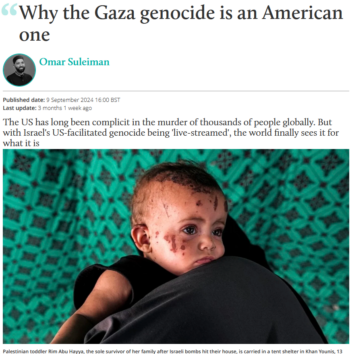
Middle East Eye (9/9/24)
So we ask both people that are part of the civil society here in the US to ask their elected officials to stop sending weapons, and to be public around choosing not to continue sending weapons. Even into the Trump administration, we ask folks to continue doing that.
There are so many avenues in which we can actually play a role as to stopping this from happening, whether it’s even putting this report out in front of your families across the holidays. We really encourage folks to use this as an opportunity to convince even more people in their surroundings to acknowledge just what’s going on, and to remind ourselves that Gaza in particular, right now in this moment, really does need the help to stop this from continuing to happen. And we in the US play a huge role in making sure that we’re not complicit in the genocide.
So people have a positionality that they can take, and there’s a moral choice here still. And we really hope that folks can continue doing everything that they can to get this to stop, because there is an opportunity for us to really make this stop.
JJ: We’ve been speaking with Iman Abid from the US Campaign for Palestinian Rights. You can find their work and their resources online at USCPR.org.
Thank you so much, Iman Abid, for joining us this week on CounterSpin. Thank you so much.
IA: Thank you.
This post was originally published on FAIR.
